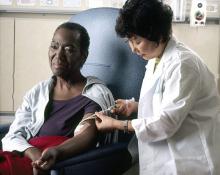A major insurance company is betting that oncology practices can handle cancer-care payments as if they were like the household grocery budget or a weekly allowance: Be frugal and you’ll have some left over for next time. Spend too much, and you’ll have to borrow from the future.
The idea of its pilot study, says UnitedHealthcare, based in Minnetonka, Minn., is to separate drug costs from treatment costs by paying oncologists an up-front, per-patient fee. (In insurance-speak, this is called a "bundled" or "episode" payment.) The payments will be based on best medical practices for three common malignancies: breast cancer, colon cancer, and lung cancer. Decisions about optimal treatment for each disease state will be determined by consensus among clinicians, and not by the insurer, the company said in a press release.
"By paying medical oncologists for a patient’s total cycle of treatment, rather than the number of visits and the amount of chemotherapy drugs given, this program promotes better, more patient-centric, evidence-based care with no loss of revenue for the physician," said Dr. Lee N. Newcomer, UnitedHealthcare’s senior vice president for oncology. "Everyone wins. As oncologists share best practices from the program about which treatment regimens are most effective, we expect to see consistently improved patient outcomes."
The company is working with five small- to mid-size oncology practices based in Dayton, Ohio; Fort Worth, Tex.; Kansas City, Mo; Marietta, Ga.; and Memphis. Analysis is to begin after a year’s data are collected.
"Over the course of the pilot, the various treatment regimens selected by the medical groups will be evaluated to identify which are the most effective for a range of clinical presentations [such as physical signs and symptoms and diagnoses]. UnitedHealthcare will play no role in determining which treatment plan the oncologists choose, but the intent of the pilot is to identify and reduce unnecessary drug administration that does not improve the patient’s health outcomes," the company stated.
Under this payment system, the insurer will determine its cancer-care payments based on the difference between drug costs and the current fee schedule of the oncology group, with payments made on the first day on which an insured patient receives care from that practice. The payments will include case-management fees to cover patient management costs.
Thus, if during the course of an individual patient’s care clinicians decide to switch to a more expensive drug, there would be no additional payments to compensate for the difference.
Each of the agreed-upon regimens in the pilot will be evaluated based on health outcomes and the frequency of adverse events, emergency department visits, and other consequences that can drive up costs without additional treatment benefit, the insurer says.
Worth a Look
The proposed payment model is an interesting approach to the goal of containing medical costs while fairly compensating clinicians and protecting high-quality patient care. But it also raises many questions about its applicability across a broad range of clinical and financial situations, say medical economists and oncologists who were interviewed for this article.
"We are pleased to see experimentation taking place around how oncology care is paid for," said Dr. Allen S. Lichter, CEO of the American Society of Clinical Oncology. "The oncology community needs to do these pilot projects, and understand whether moving away from the current models based on fee-for-service and some percentage of margin off the chemotherapy agents can be replaced by something else – and if so, what should that something else look like and how does it work?"
"I think it's an interesting experiment and an important one, one that Dr. Newcomer and United can run because of their large claims-based database, and we’re all interested to see how it works," agreed Dr. Samuel M. Silver, chair of the subcommittee on reimbursement for the American Society of Hematology and a professor of internal medicine at the University of Michigan in Ann Arbor.
Jack Hoadley, Ph.D., a health policy analyst and research professor at the Health Policy Institute at Georgetown University in Washington, D.C., noted that "Medicare has tried a number of experiments with various types of bundled payments, and it seems [as if] Medicare could either watch what’s going on in this private-sector pilot and use that as a way to learn, or – sooner than that – try bundled-payment structures to see how they work."
Outliers Could Be a Problem


